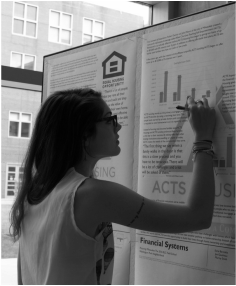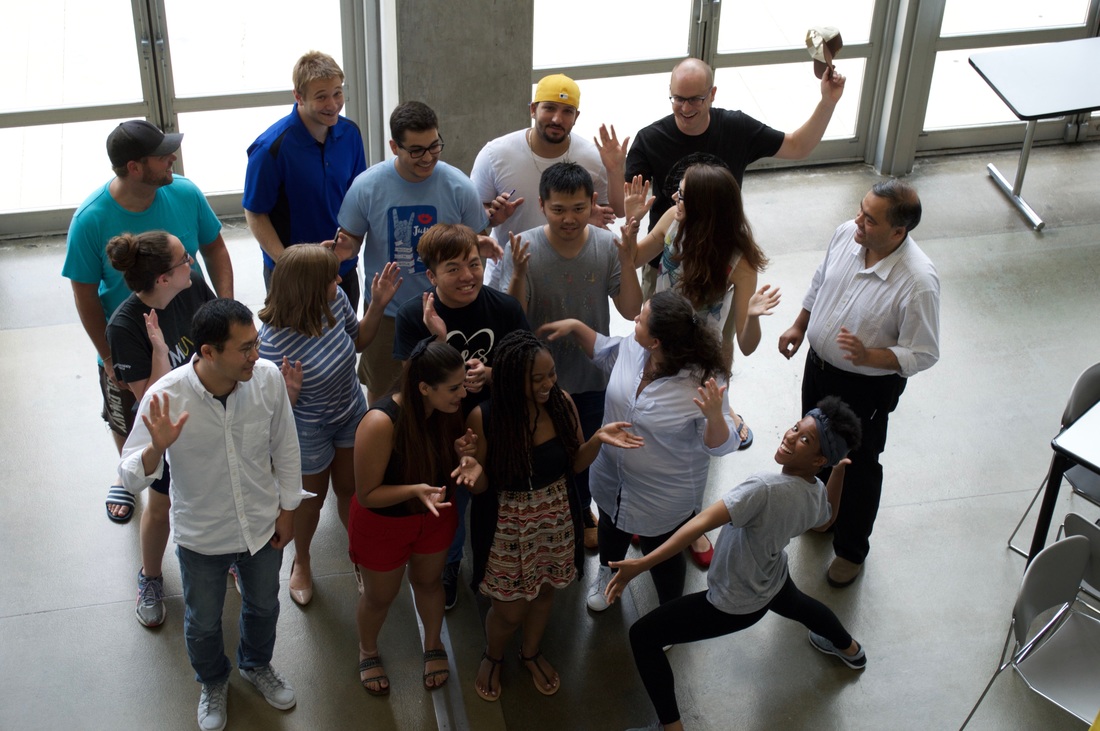
In the Wake Of
Esmé Barniskis, English, UWM Tuesday, July 12, 2016 In the wake of last week's violence, I struggle to find a voice in the turmoil. Do I even have the authority to speak about this all? How can we move forward from this? What of our daily lives? How then do we alter our ways of being so that this violence--in Baton Rouge, in Minnesota, in Dallas--is not repeated? I've been musing all weekend, trying to see how our Milwaukee lives can shape a better future for our society overall. The connections between the nation's social upheaval and our work in the Washington Park neighborhood are vague, hidden under the surface, but very much present. Our nation struggles to adequately face, acknowledge and then heal the harsh realities of its very own citizens. In a neighborhood with an incredibly diverse ethnic population –– Hmong, African American, Hispanic/Latino, Burmese, Somali, and so on –– the complicated relationships between race, economic class, immigration, crime/incarceration, policing, and poverty are apparent in the quietly-lived daily experiences of its residents. As an outsider, looking to "research" this community, it is easy for me to feel both displaced from my own native turf and inconvenient to the lives of residents. Who am I, after all, to sweep in and attempt to tell a story of this neighborhood, regardless of how much we rely on the community residents to tell their own truths? I am still struck, five weeks later, by the foreclosed home I walked in. The family photos, with one man wearing what looked to be a prison jumpsuit, scattered on the floor, tells the story of how this place and its residences were tied up in a struggle to maintain their home, both physical and familial. The eviction must have came suddenly, and I wonder still if the man in the jumpsuit was home by the time they had to leave. Or was the family further fractured –– pushed apart by incarceration, and then pushed out of their most private space –– the family home? Overall, the neighborhood faces challenges that are not faced by majority-white neighborhoods. Last week the nation was forced to confront – once again –– the systemic violence against people of color and the horrors of the lone gunman. I wonder, in Washington Park, how many paused, tying together their own experiences with the fatalities of Baton Rouge and Minnesota and perhaps those in Dallas too. Then again, as an outsider, isn't my assumption that some residents have had similar experiences an product of my biases, my clouded perspective or my lack of real experiential knowledge? I interviewed participants in the 2014 Field School in the fall of 2014, and I still remember what one of them said to me: "I can't say that we witnessed poverty, we just saw something that might look like it." This deferential non-assumption is what we need most of all. Yet when we walked in the foreclosed home, the temptation to cast judgments and make class-based assumptions about the last residents was strong. How then could we move on, from assuming to know the stories of a neighborhood while at the same time researching and trying to make those stories more evident and factually true? How then can we accept our requirement to be deferential to the residents, to their experiences, while at the same time trying to pinpoint areas for action to end poverty and violence? The paradoxes of being a researcher in a neighborhood to which I do not belong are more apparent now than they were two years ago, when I was struggling to adequately find any sort of researcher's voice. Now I feel as though I stand at the other end, offering up some voice but unsure if it is the right one. Could community-based research help in any real way to heal this country? Again, I am reminded of my interviewee, when he said that the Field School "goes beyond neighborhood-based issues [of poverty]" and connects to the larger fabric of it all. Our tiny actions –– phone calls, greeting residents by name, asking about gardens and children, visiting locations that matter to the community, asking, always, if our rendering of their lives are accurate –– amount to something beyond a cold neighborhood analysis. Whether or not the Field School plays a role in ending violence, I can't say. The end result is not yet felt and won't be for years. Yet the real human connections we have made might simply be enough to remind residents of the real respect we, as outsiders, have for the community. I still struggle to find a way to deal with the horrors our country is putting itself through. I'm not sure if our research makes a difference. I'm not sure if we are even on the right track. All of these uncertainties, however, make it that much more important to keep trying. To do nothing, or to assume to already know the answer and the stories, is what we cannot let ourselves succumb to. Wading through papers and toys, the soft smells of dirt and rot arose with every step. I stared at the small piano left in the dining room. Guilt overtook me. Why would I have assumed a family who was evicted would not have owned a piano? There are no guidelines over what a family at risk of eviction can and cannot have, yet in that moment of quiet assumption, I fell into the trap of projecting my biases onto the realities of residents and people who are both radically different from me and yet at the core similar. While I'm not proud of my biases and assumptions, I feel now is the time to lay them out on the table, to recognize them and then ultimately set them aside, discard these preconceived notions and simply work forward. |
Telling stories of home is an inexhaustible undertaking. We have been relentlessly collecting tales from the domestic worlds in Washington Park, Milwaukee. Parables of home drew us to many homeowners, tenants and residents of the neighborhood. We realized that contrary to the mythical narrative of the American Home that foregrounds family, safety, comfort and privacy, home-stories are more diverse and complicated. Stories of domesticity in the twenty-first century are stories of work, labor, struggles, successes and disappointments. These are also stories that are ignored and erased.
We stood speechless at the sight of homes lost, foreclosed and abandoned. Each of these stories brought us closer to a world of inequity, injustice, and historic neglect. Human stories of disaster are not tales of individual failures that our politicians and media would like us to believe. Instead, they point towards a collective history of inequality and injustice that we need to confront as a community and as a nation. The 2016 field school also introduced us to ACTS Housing, a Milwaukee-based organization whose motto is “empowerment through homeownership.” We met a group of people whose daily labor, dedication and hospitality inspired us. This year’s projects stand testimony to the world that this organization and its staff opened up to us. It is a world where the humanity and courage of common people and everyday life continue to thrive and stand as a living proof of our collective humanity. Arijit Sen https://senspeaks.wordpress.com |



















